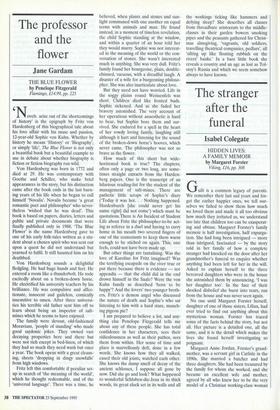The professor and the flower
Jane Gardam
THE BLUE FLOWER by Penelope Fitzgerald Flamingo, £14.99, pp. 225 'Novels arise out of the shortcomings of history' is the epigraph by Fritz von Hardenberg of this biographical tale about his love affair with his muse and passion, 12-year-old Sophie von Kuhn. Whether by history he means 'History' or 'Biography', or simply 'life', The Blue Flower is not only a beautiful book but a beautiful example to use in debate about whether biography is fiction or fiction biography run wild.
Von Hardenberg was born in 1772 and died at 29. He was contemporary with Goethe and Schiller, who make brief appearances in the story, but his distinction came after the book ends in the last burn- ing years of his life when he began to call himself `Novalis'. Novalis became 'a great romantic poet and philosopher' who never- theless 'wished that he was dead'. This book is based on papers, diaries, letters and public and private documents that were finally published only in 1988. 'The Blue Flower' is the name Hardenberg gave to one of his early folk-tales written as a stu- dent about a chosen spirit who was sent out upon a quest he did not understand but yearned to fulfil. It still haunted him on his deathbed.
Von Hardenberg sounds a delightful fledgling. He had huge hands and feet. He entered a room like a thunderbolt. He rode excitedly about on a broken-down horse. He electrified his university teachers by his brilliance. He was compulsive and affec- tionate, innocent and guileless, comically insensitive to omen. After three universi- ties his terrible old father sent him off to learn about being an inspector of salt- mines which he seems to have enjoyed.
The family were devout, old-fashioned Moravians, 'people of standing' who made good sardonic jokes. They owned vast decaying properties here and there but were not rich except in bed-linen, of which they had so much they need wash but once a year. The book opens with a great cleans- ing, sheets 'dropping in dingy snowfalls' from high windows.
Fritz left this comfortable if peculiar set- up in search of 'the meaning of the world', which he thought redeemable, and of the `universal language'. There was a time, he believed, when plants and stones and sun- light communed with one another on equal terms with animals and man. He found instead, in a moment of timeless revelation, the child Sophie standing at the window, and within a quarter of an hour told her they would marry. Sophie was not interest- ed in the meaning of the world or the con- versation of stones. She wasn't interested much in anything. She was very dull. Fritz's family found her bourgeoise, plain, double- chinned, vacuous, with a dreadful laugh. A disaster of a wife for a burgeoning philoso- pher. She was also inarticulate about love.
But they need not have worried. Life in the soggy plains round Weissenfels was short. Children died like frosted buds. Sophie sickened. And as she faded her bravery astonished. The very account of her operations without anaesthetic is hard to bear, but Sophie bore them and sur- vived. She endured for a spell in the heart of her rowdy loving family, laughing still although it hurt and listening for the sound of the broken-down horse's hooves, which never came. The philosopher was not so brave as the flower.
How much of this short but wide- horizoned book is true? The chapters, often only a page or two long, are some- times straight extracts from the Harden- berg papers. One is the transcript of an hilarious reading-list for the student of the management of salt-mines. There are pathetic little scraps of Sophie's diary (`Today it was hot. . . Nothing happened. Hardenburch [she could never get his name right] did not come') which must be quotations.There is An Incident of Student Life about Fritz the philosopher-to-be act- ing as referee in a duel and having to carry home in his mouth two severed fingers of one of the contestants to keep them warm enough to be stiched on again. This, one feels, could• not have been made up.
But other things are tantalising. Was the love of Karoline for Fritz imagined? Was the terrifying escapade on the river true or put there because there is evidence — see appendix — that the child did in the end drown himself in the Saale? Were the von Kuhn family as described 'born to be happy'? And the lovers' two younger broth- ers, Fritz's a demon angel who discussed the nature of death and Sophie's who sat listening to him with a hard stare, munch- ing pigeon pie?
I am prepared to believe a lot, and any- thing else Penelope Fitzgerald tells me about any of these people. She has total confidence in her characters, sees their ridiculousness as well as their pathos, sees them from within. Her sense of time and place is marvellously deft, done in a few words. She knows how they all walked, eased their old joints, watched each other. She knows the damp smell of decay of the ancient schlosses, I suppose all gone by now. Did she go and look? What happened to wonderful Schloben-die-Jena in its thick woods, its great clock set in its walls and all the workings ticking like hammers and defying sleep? She describes all classes from threadbare aristocrats to the middle- classes in their garden bowers smoking pipes and the peasants gathered for Christ- mas almsgiving, 'vagrants, old soldiers, travelling theatrical companies, pedlars', all `silting up like floating rubbish on the rivers' banks.' In a bare little book she reveals a country and an age as lost as Tol- stoy's Russia and which we seem somehow always to have known.


































































 Previous page
Previous page